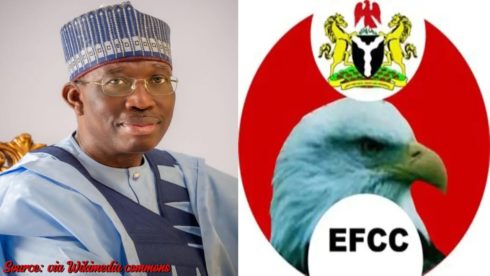The Economic and Financial Crimes Commission (EFCC) has apprehended former Delta State Governor Ifeanyi Okowa. Okowa, who served as governor from 2015 to 2023, was taken into custody amid allegations of misappropriating state funds derived from resource allocations. The EFCC’s arrest of Okowa has sparked widespread public attention, underscoring the agency’s intensified efforts to address financial misconduct within the political sphere.
The EFCC announced Okowa’s arrest on Monday, stating that he is suspected of siphoning off funds earmarked for developmental projects in Delta State. According to preliminary investigations, Okowa allegedly diverted substantial amounts, intended to improve infrastructure, education, and health services, to private accounts and unidentified ventures.
The Allegations: Misuse of Delta State Resource Allocation
The EFCC’s case against Okowa centers around accusations that he misappropriated resource allocation funds designated for Delta State during his tenure. Specifically, the agency alleges that Okowa misused these funds, which derive primarily from the state’s oil-rich resources and are meant to promote regional development. These allegations suggest that Okowa may have directed millions into unauthorized personal projects rather than state development.
According to insiders, the funds were purportedly diverted through a series of complex transactions. The EFCC has pointed out that Okowa’s administration may have manipulated financial records to conceal these transfers, raising concerns over potential collusion among state officials and financial institutions.
Details of Okowa’s Arrest and Ongoing Investigation
Okowa’s arrest took place in Abuja, where EFCC officials detained him for questioning. Reports indicate that the former governor was cooperative upon his arrest, although he has reportedly denied all allegations of misconduct. Sources within the EFCC reveal that the agency had been monitoring Okowa’s activities since early 2023, gathering substantial evidence to support the charges before taking him into custody.
As of now, Okowa remains in EFCC custody pending further interrogation. Legal experts suggest that if found guilty, the former governor could face substantial penalties, including prison time and asset forfeiture. The EFCC has emphasized its commitment to conducting a thorough investigation to establish the full scope of any financial improprieties.
Public Reaction: Delta Residents Demand Accountability
The news of Okowa’s arrest has generated mixed reactions across Delta State, with many residents calling for stringent punishment if he is found guilty. Civic groups and social activists have organized peaceful protests, demanding accountability and transparency in the management of public resources. For citizens of Delta State, where poverty rates remain high despite significant resource wealth, Okowa’s arrest brings hope for a renewed focus on ethical governance.
Public opinion is sharply divided, however, as some supporters of Okowa contend that the charges are politically motivated. They argue that his policies as governor benefited the state and that the EFCC’s actions may be influenced by rival political interests. Nevertheless, a majority of the public appears supportive of the investigation, viewing it as a necessary step toward greater transparency.
EFCC’s Broader Anti-Corruption Drive
The arrest of Okowa aligns with the EFCC’s broader mission to tackle corruption at all levels of government. This latest high-profile arrest is part of a series of crackdowns targeting public officials accused of embezzlement, money laundering, and misuse of office. Since the beginning of the year, the EFCC has reportedly arrested multiple former and current state officials, signaling a no-tolerance stance on financial malfeasance.
The EFCC’s efforts reflect the Nigerian government’s commitment to fighting corruption as a core national agenda. By intensifying these actions, the agency aims to recover billions lost to corrupt practices, thereby promoting economic growth and restoring public trust in government institutions. However, the effectiveness of these anti-corruption measures remains a topic of debate among Nigerians.
Legal Proceedings: What Comes Next for Okowa
Following his arrest, Okowa is expected to appear in court as the EFCC moves forward with formal charges. The case is likely to involve several hearings and may span months, depending on the complexity of evidence presented by both sides. Okowa’s legal team has expressed confidence that he will be exonerated, claiming that the former governor’s actions were in line with lawful state procedures.
Legal analysts anticipate that the trial will be closely watched, as it could set a precedent for future cases involving allegations of corruption against high-ranking officials. If convicted, Okowa’s case may lead to reforms in the oversight of resource allocation funds, potentially prompting stricter controls to prevent similar instances of alleged fund diversion.
Table of Contents
Discover more from OGM News NG
Subscribe to get the latest posts sent to your email.














